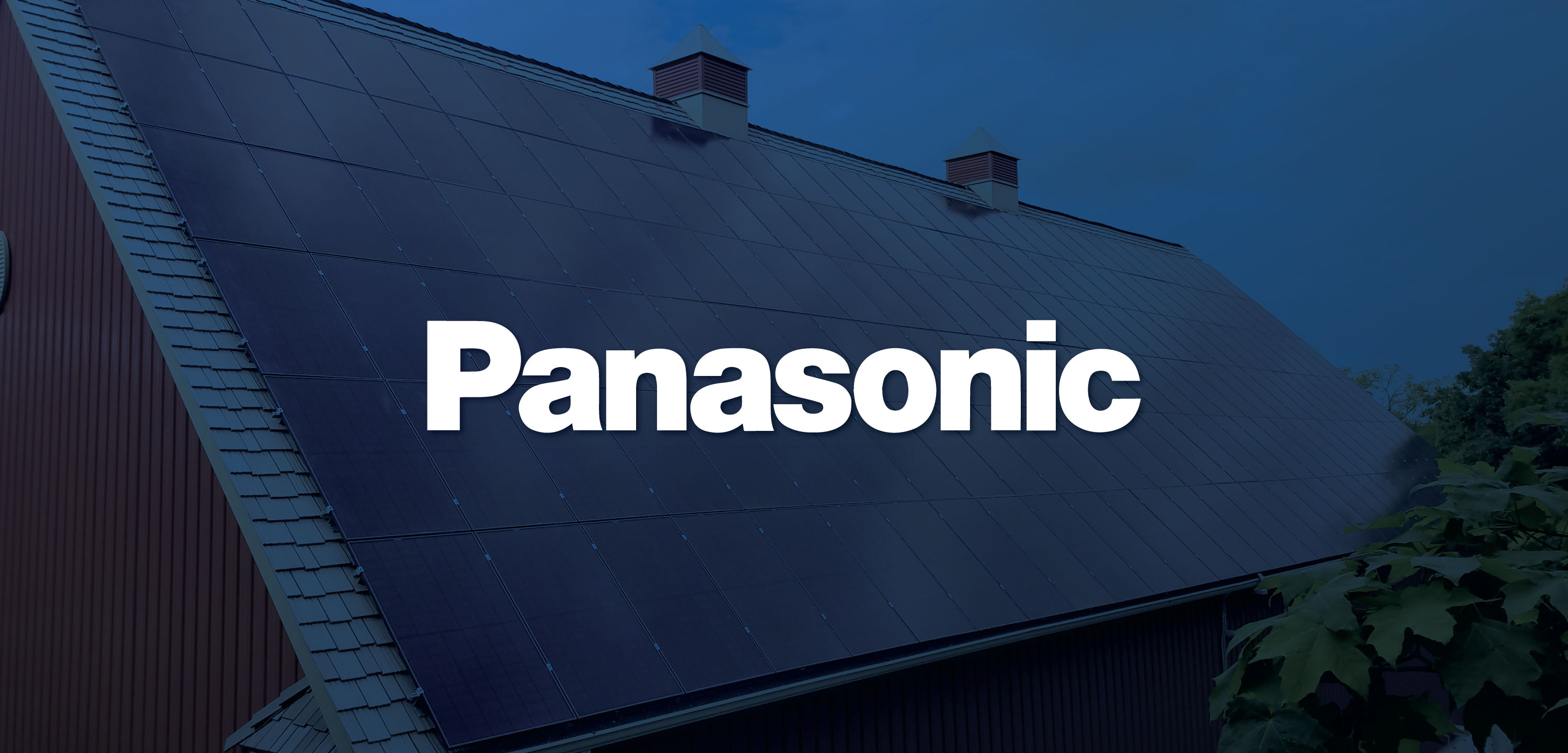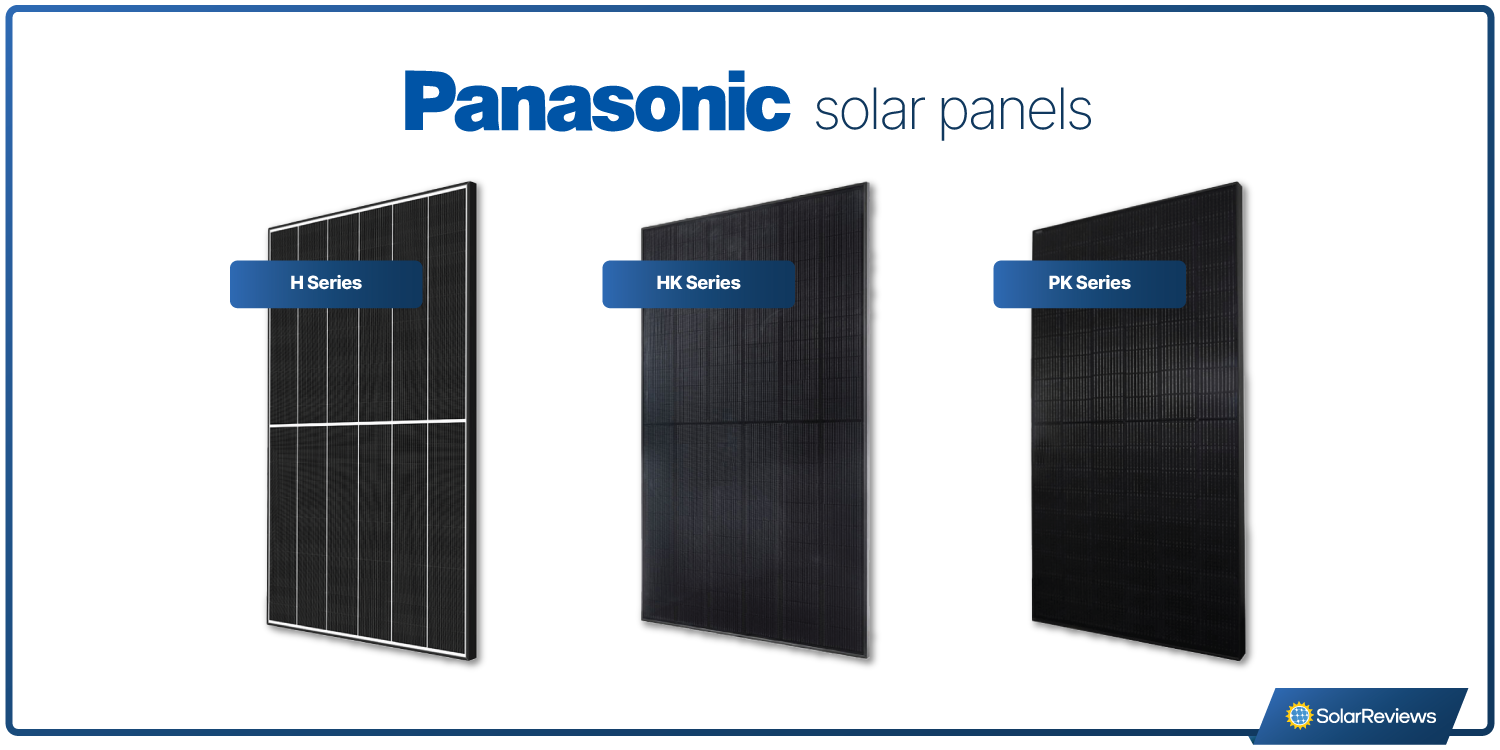Updated 8 months ago
2025 Panasonic Solar Panels: Expert Review and How to Buy
Written by
Catherine Lane

Find out what Panasonic solar panels cost in your area
Note: On April 28, 2025, Panasonic North America announced it would discontinue its solar and battery storage offerings. The company has said it is committed to long-term warranty support for existing customers as well as customers with installations in progress. The article below was written before the announcement, and the information contained within may be out of date.
Panasonic solar panels are a great addition to any household because of their impressive performance and because Panasonic is a name you can trust. Our solar experts named Panasonic the 6th best solar panel brand for U.S. homeowners in 2025, giving them an Excellent rating.
Our experts breakdown everything you need to know about Panasonic solar panels and if they’re right for your roof.
Key takeaways
-
Panasonic was named the 6th best solar panel brand according to SolarReviews’ experts.
-
Panasonic panels typically cost about $3.20 per watt to install, or about $21,816 for an average sized system.
-
Panasonic uses HIT and half-cut solar cell technology so their panels can operate better under real-world conditions, and can convert more sunlight into electricity.
-
Panasonic’s solar warranty is better than most warranties on the market, guaranteeing that its panels will operate between 90% and 92% of their initial power rating after 25 years.
How good are Panasonic solar panels?
When our experts review solar panel brands, we look at six things: module quality, warranty, company financial performance, U.S. investment, value, and dealer network quality. Panasonic scored well enough in all categories to get our Excellent rating and a 4.83-star customer rating on SolarReviews.
Panasonic really shines when it comes to panel performance. For years, Panasonic has used heterojunction (HJT) solar cells, which combine monocrystalline cells and thin-film materials to capture more wavelengths of light and generate more electricity.
HJT technology, also called HIT, has also put Panasonic as the leader of the pack regarding real-world performance - EverVolt panels have some of the best temperature coefficients, meaning they perform better at higher temperatures than most panels. The EverVolt PK Black Series uses PERC technology as opposed to HJT, which doesn’t make a huge difference for homeowners, but it’s slightly less efficient than the HIT models.
Overall, Panasonic panels tend to be high-efficiency, high-performing panels that make a great option for homeowners looking for panels from a trusted name or those with limited roof space.
Pros and cons of Panasonic solar panels
Pros
-
Impressive specs
-
Excellent warranty
-
Reputable company
Cons
-
Expensive
-
Manufactured by a third party
-
Limited U.S. investment
Panasonic solar panels have great performance specifications and a strong warranty that’s backed by a large, reputable company. While their products fall just shy of premium brands like Maxeon, they’re still excellent panels, specifically when it comes to temperature coefficient. This means you can expect reliable performance even in less-than-ideal conditions.
One of the biggest drawbacks of choosing Panasonic panels is their higher price tag compared to other options. Even though the quality is impressive, similar or even superior alternatives may be available at a lower cost. Additionally, Panasonic does not manufacture its own solar panels—a minor drawback, but we tend to favor companies that produce their own products. It’s also important to note that some solar brands have shifted to American solar manufacturing, something Panasonic is slow to adopt.
Panasonic solar panel models

Panasonic offers a number of solar panels, but the H Series, HK Series, and PK Series showcase how different the EverVolt Series panels can look.
Panasonic’s EVERVOLT solar panels come in a variety of models. The five EVERVOLT series and their specifications are outlined in the table below:
Series | Power Output | Efficiency | Temperature Coefficient |
|---|---|---|---|
EVERVOLT HK2 Black Series | 420 - 430 W | 21.7 - 22.2% | -0.24%/*C |
EVERVOLT K Black Series | 350 - 370 W | 20% - 21.2% | -0.26%/*C |
EVERVOLT PK Black Series | 350 - 370 W | 19.2% - 20.3% | -0.36%/*C - -0.34%/*C |
EVERVOLT H Series | 400 - 410 W | 21.6% - 22.2% | -0.26%/*C |
EVERVOLT HK Black Series | 390 - 410 W | 21.1% - 22.2% | -0.26%/*C |
The HK2 is the newest and most impressive of Panasonic’s EVERVOLT series. With efficiency ratings of up to 22.2% and a maximum output of 430 watts, the HK2 panels are designed to deliver high performance and meet your energy needs.
The EVERVOLT H Series panels use PERC solar cell technology, which can generate power more efficiently than traditional monocrystalline solar cells. Panasonic’s other EVERVOLT modules utilize Heterojunction with Intrinsic Thin Layer, or HIT, cell technology, which Panasonic is known for. HIT cells contribute to Panasonic solar panels’ exceptional temperature coefficients and superior performance in non-ideal conditions.
What is Panasonic’s solar panel warranty?
Panasonic has three different solar warranties depending on what equipment is installed with your system: The EverVolt AllGuard warranty, the AllGuard warranty, or the TripleGuard warranty. The following table outlines some of the terms for each type of warranty:
Warranty | TripleGuard Warranty | AllGuard Warranty | EverVolt AllGuard Warranty |
|---|---|---|---|
Product warranty | 25 years | 25 years | 25 years |
Performance warranty (PK Series) | 86% after 25 years | 86% after 25 years | 86% after 25 years |
Performance warranty (all other EverVolt Series) | 92% after 25 years | 92% after 25 years | 92% after 25 years |
Labor warranty | 25 years when installed by Authorized Installer | 25 years when installed by Authorized Installer | 25 years when installed by Authorized Installer |
Additional equipment covered* | None | Modules, inverters, racking, monitoring | Battery storage, storage inverter, racking |
*Special conditions apply to qualify. Please review Panasonic’s official warranty terms for more details.
Panasonic offers excellent warranties, especially for customers who purchase additional equipment through Panasonic or use an Authorized Installer. The 25-year product warranty exceeds the industry standard of 12 to 15 years. Including a labor warranty when choosing an Authorized Installer is fantastic, as most solar panel brands don’t include labor warranty terms.
The performance warranty you get can vary with the model you choose. The PK Series is guaranteed to operate at 86% of its initial output after 25 years. This is a pretty average warranty. All other EverVolt models, however, are set to perform at 92% of their initial output after 25 years. That means most EverVolt panels will last longer than panels from many competitors!
The best part of Panasonic’s warranty is that it comes from Panasonic! The brand has been around for over a century, so it’s probably not going anywhere anytime soon. So, in the extremely rare event you run into an issue with your solar panels, Panasonic will be there to honor the warranty!
How much do Panasonic solar panels cost?
Panasonic solar panels cost around $3.20 per watt to install, making them more expensive than the national average cost of solar of $3.03 per watt. An average 7.2-kilowatt solar installation using Panasonic solar panels would cost about $21,816 before incentives are applied.
Considering Panasonic’s solid performance metrics and great warranty, it’s no wonder they’re more expensive! But you can probably find comparable panels for cheaper from brands like Qcells or Canadian Solar.
Panasonic solar power systems qualify for solar incentives and rebates, like the 30% federal solar tax credit, which lowers the overall cost of going solar. The price you pay will also depend on the installer you choose! That’s why we recommend getting at least three solar quotes.
How to buy Panasonic solar panels for your home
Panasonic solar panels make a great addition to your roof if you’re looking to save money on your electricity bills and lower your carbon footprint.
You can find authorized Panasonic dealers through Panasonic’s website, but we recommend getting quotes from a variety of companies to truly get the best solar installation possible. When you get at least three solar quotes, you can compare pricing, equipment, and the installers’ reputation to get a top-quality installation for the right price.
You can join the 1.5 million homeowners who have used SolarReviews to connect with trusted local solar companies in their area.
Catherine has been researching and reporting on the solar industry for five years and is the Written Content Manager at SolarReviews. She leads a dynamic team in producing informative and engaging content on residential solar to help homeowners make informed decisions about investing in solar panels. Catherine’s expertise has garnered attention from leading industry publications, with her work being featured in Solar Today Magazine and Solar ...
Learn more about Catherine Lane